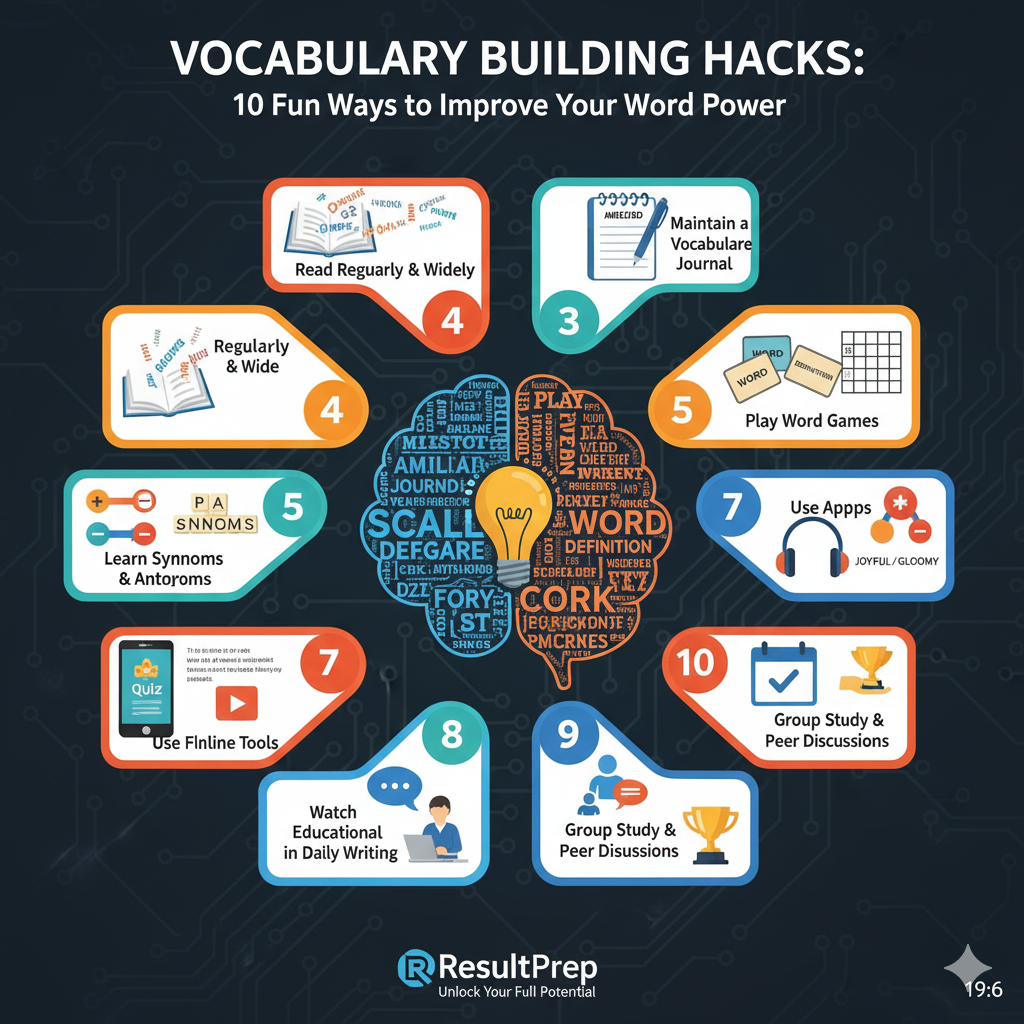Vocabulary Made Easy: 10 Fun Hacks to Boost Word Power
Supercharge your English for CUET, CLAT, IELTS & more! Discover 10 exciting, student-friendly hacks—from flashcards & word games to apps & podcasts—that make vocabulary building simple, fun & effective.
CUET
9/29/20253 min read


Vocabulary Building Hacks: 10 Fun Ways to Improve Your Word Power
Introduction
A strong vocabulary is a key skill for academic success, competitive exams like CUET, CLAT, SSC, IELTS, and effective communication in daily life. Students with a rich vocabulary can read faster, comprehend better, write effectively, and express ideas with confidence. Developing word power may seem challenging, but with fun and practical methods, it becomes an engaging and rewarding journey. This blog explores 10 innovative and student-friendly strategies to improve your vocabulary, making learning enjoyable while boosting exam performance.
1. Read Regularly and Widely
Reading is one of the most effective ways to acquire new words. Explore books, newspapers, magazines, and online articles. Classic novels, non-fiction books, and quality newspapers like The Hindu or The Indian Express expose students to diverse vocabulary. Pay attention to words used in context, and note their meanings, pronunciations, and usage. Reading diverse genres, from science articles to historical novels, ensures exposure to varied vocabulary, which is often tested in exams like CUET and CLAT.
2. Maintain a Vocabulary Journal
Keeping a dedicated notebook or digital document to record new words, meanings, synonyms, antonyms, and sample sentences is highly effective. Reviewing this journal daily reinforces memory. For example, if you encounter the word ameliorate, write: “Ameliorate – to improve or make better. Synonym: enhance, antonym: worsen.” Repetition and usage in sentences solidify understanding and recall.
3. Use Flashcards for Quick Learning
Flashcards are perfect for memorization and revision. Write the word on one side and its meaning and example sentence on the other. Students can carry them easily and review words anytime, making learning mobile-friendly and interactive. Digital flashcard apps like Quizlet allow students to test themselves with quizzes and games, turning vocabulary learning into an enjoyable challenge.
4. Play Word Games
Interactive word games such as Scrabble, crossword puzzles, word search, and vocabulary quizzes stimulate learning while making it fun. Playing with friends or classmates encourages healthy competition and increases retention. This method is particularly useful for exam preparation, as it strengthens memory of spelling, meanings, and usage.
5. Learn Synonyms and Antonyms
For every new word, learn its synonyms and antonyms. This not only deepens understanding but also enhances flexibility in writing and speaking. For instance, learning happy along with synonyms like joyful, delighted and antonyms like sad, gloomy provides multiple options for effective expression, which is valuable in essay writing and comprehension sections.
6. Use Apps and Online Tools
Several apps and websites are designed to improve vocabulary interactively. Platforms like Merriam-Webster, Vocabulary.com, and WordUp provide daily words, quizzes, and pronunciation guides. Using these apps for 10–15 minutes daily ensures consistent practice, especially for students preparing for English-heavy competitive exams.
7. Incorporate Words in Daily Writing
Practice actively using new words in daily writing exercises, including essays, journals, social media captions, or emails. Applying words in context helps transfer them from passive recognition to active use. For example, replacing good with exceptional in sentences improves style, precision, and language flair.
8. Watch Educational Videos and Listen to Podcasts
Learning through videos and podcasts exposes students to advanced vocabulary in context. TED Talks, YouTube educational channels, and English language podcasts improve comprehension and pronunciation while reinforcing retention. Students can note unfamiliar words, check meanings, and practice usage in sentences.
9. Group Study and Peer Discussions
Discussing new words with friends, study groups, or mentors encourages active learning. Explaining words to others reinforces memory and boosts confidence. Group quizzes, word games, and debates make vocabulary-building interactive and social, reducing the monotony of solo study.
10. Set Daily and Weekly Goals
Consistency is crucial. Set daily or weekly targets, such as learning 5–10 new words per day. Small, achievable goals ensure regular progress and reduce stress. Reward yourself for reaching milestones, such as finishing a vocabulary list or mastering 50 new words in a week, to stay motivated and consistent.
Conclusion
Building vocabulary is not merely memorizing lists of words; it involves understanding, using, and enjoying language. By integrating reading, writing, games, apps, and discussions, students can improve their word power efficiently and make learning enjoyable. A strong vocabulary enhances comprehension, writing, and confidence, giving students an edge in CUET, CLAT, IELTS, and other competitive exams.
At ResultPrep Coaching, we offer structured programs for vocabulary enhancement, including reading exercises, interactive activities, and practice tests, to ensure students develop strong word power and excel in English and competitive exams. With dedication, consistent practice, and creative learning strategies, students can expand their vocabulary and communicate with clarity and confidence.
📞 Call: 8970007497
🌐 Visit: www.resultprep.com
Prepare for the best results!
Achieve your goals with expert coaching and support from ResultPrep.
Contact us:
© 2025. All rights reserved.
Address:
GSS Complex, 2nd Floor,
16th Cross Rd, HMT Layout, Vidyaranyapura, Bengaluru, Karnataka- 560097
